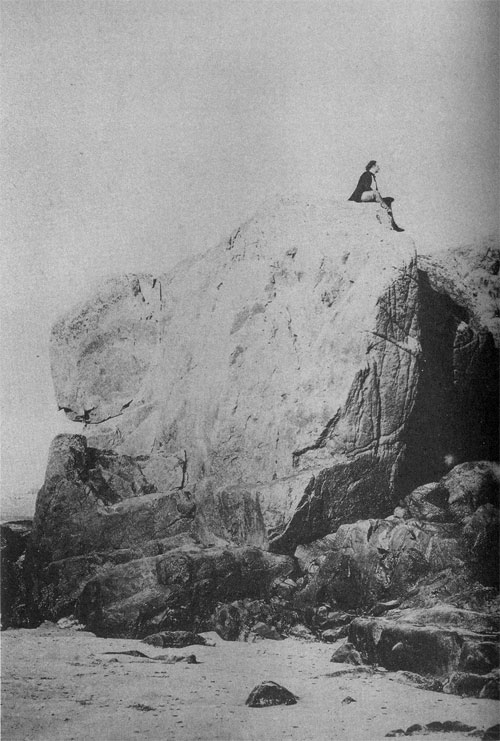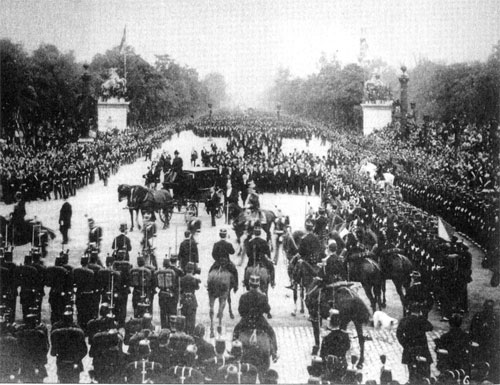The Power of Love - Appendix I

A Photography of Victor Hugo contemplating the ocean at Jersey
Appendix I
Hugo — A Summary of his Life
Victor Hugo was born in 1802, the son of an army officer and soon-to-be general of Napoleon. Napoleon Bonaparte was not yet emperor at that time but as First Consul for life he was the effective head of state and he seemed by then to have defeated all the enemies of France.
By the age of 13 Victor Hugo had realised that he had a literary calling, his early poems winning a number of awards, including two "mentions" from the Academie Francaise. During the 1820s he became one of the leading figures of the French Romantic movement1. In 1830 his position was enhanced by the success of the play Tiernan? which was subject to fierce controversy, symbolising as it did the conflict between new Romantic ideas and classical French theatre. Indeed, the "battle" surrounding the play
I. What is generally meant by romanticism (or romantic era) especially in France is an artistic and literary movement born at the end of the XVIIIth century, proceeding from an original view of man and of the world. It prefers imagination, intuition and sensibility to reason. It gives more importance to what is specific to the individual and less to what is common to all men. It celebrates in the individual the intense but indefinable feelings, the aspiration for something unattainable, the exaltation caused by the contemplation of the impossible and the torment of not being able to achieve it. It expresses also a passionate love for nature. As an artistic movement, it rejects the classical rules (which were very strict particularly in French tragedy) and more generally it wants to break old forms. According to the romantics, nothing should interfere with the free expression of the artist's emotions.
is now considered to be a major turning point in French literary history.
That battle announced another one, this time a political one, a few months later, when a popular uprising overthrew the Bourbon monarchy. 1830 saw the publication of Notre Dame de Paris, with its evocation of life in the Middle Ages centred on the famous Paris cathedral. This novel has of course been on more than one occasion successfully adapted for the cinema, most recently as a Disney cartoon
In 1841 Hugo was elected (at the fifth attempt) to the Academie Francaise. Later he increasingly turned his attention to public and political issues, becoming a Peer of France in 1845. Tragedy also struck during this period when, in September 1843, his daughter Leopoldine and her husband were drowned in the Seine at Villequier in Normandy.
In his earlier years Hugo had been a monarchist, and during the political upheaval in 1848 (which replaced the monarchy with a republic) Hugo was mainly concerned that order should be maintained, initially welcoming and supporting the candidature of Louis Bonaparte (a nephew of the emperor Napoleon) as President of the Republic. He began to realise, however, that his moral and political ambitions were not shared by his political allies, and his relationship with them soon deteriorated.
By July 1851, his opposition to Louis Bonaparte had hardened with his coining of the phrase "we have had Napoleon the Great, now we have to have Napoleon the Small", and after the Coup d'etat of the 2nd December, (in which Louis proclaimed himself emperor) he fled the country to avoid arrest, initially to Brussels. It was clear however that, as a close neighbour of France, the Belgian authorities were concerned that Hugo's political statements would strain relationships between the two countries, and in 1852 Hugo moved to Jersey (one of the Channel islands) where there were already a number of "proscribed" opponents to the new French regime. From there he published Les Chatiments (Punishments) in which he proclaimed his despise for the new emperor. It is also in Jersey that he started to be interested in
spiritualism.
The agitation of the French exiles irritated the local authorities and led to Hugo having to leave Jersey for another island Guernsey. In 1856, he published Les Contemplations, a book of poetry which was an immediate success, and with the proceeds he bought 38 Hauteville, now often known simply as Hauteville House, which he decorated in his own highly imaginative manner. There the view of the ocean and the sight of the French coast in the distance stirred his imagination. In exile Hugo wrote, completed or published the majority of the works for which he is best known, in particular Les Contemplations (1856), Les Miserables (1862), La Legende des siecles (1877), William Shakespeare (1864), Les Chansons des rues et des bois (1865), Les Travailleurs de la mer (1866), L'Homme qui rit (1869), and Quatre-Vingt-Treize (1874). To varying degrees these works were substantial popular successes, particularly of course Les Miserables which remains a popular literary work even today. It illustrates some of Hugo's ideas on the social and moral issues of the time, which he felt to be important. Therein he dwells at length on justice, religion, morality, education, poverty and crime. This long novel has been translated in many languages and has given birth to innumerable plays, films and musicals.
Following the fall of Louis Bonaparte in 1870, Hugo returned to France as a hero and once more took an interest in political life during another period of upheaval further complicated by the Franco-Prussian war. He was elected to the National Assembly in 1871 and was by now the idol of the republican left as well as a famous public and literary figure. Publication of his works continued, including, in 1877, L'Art d'être grand-pere, one of the first books in French literature to deal specifically with childhood.
Hugo was also a believer in European integration, and as an illustration of this, on the 14th of July 1870, he planted in the garden of Hauteville House an oak (which still flourishes today), predicting that when the tree was mature "The United States of Europe", uniting all European nations, would have become a reality.
Hugo's wish was to be buried in a pauper's coffin. While this wish was granted, he was nevertheless, on his death in 1885, voted a National Funeral by the two government assemblies. The coffin lay in state under the Arc de Triomphe and, on the 1st of June 1885, he was buried as a national hero in the Pantheon. It is estimated that a crowd of at least two million people followed the funeral procession.
Main political upheavals during Hugo's life
1802 Plebiscite confirms Napoleon Bonaparte as First Consul for Life
1804 Napoleon I crowned Emperor
1815 Napoleon's defeat at Waterloo. Abdication. Louis XVIII becomes King of France.
1824 Louis XVIII dies and Charles X ascends the throne.
1830 Charles is overthrown and in his place the more liberal Louis-Philippe is made a constitutional monarch.
1832 Unsuccessful uprising by Parisians to overthrow the monarchy. This is the rebellion Victor Hugo described in Les Miserables.
1848 The monarchy is overthrown. Louis Napoleon elected President of the Second Republic.
1851 Louis Napoleon dissolves the National Assembly and proclaims himself Emperor. Second Empire begins.
1870 Franco-prussian war. France is defeated and Napoleon III is taken prisoner. Proclamation of the Third Republic which will last till 1940. Siege of Paris.
1871 Popular Parisian uprising called La Commune, which would be cruelly repressed by the government.
Timeline
1802
February 26: Birth in Besancon, France.
1815-18
Attends the Lycee Louis-Le-Grand in Paris.
1817
Honoured by the French Academy for a poem he wrote and wins first place in a national poetry competition. Hugo was an excellent student who excelled in mathematics, physics and philosophy.
1822
His first book, Odes et Poesies Diverses (Miscellaneous Odes and Verses) is published.
Wins a pension of 1,000 Francs per year from King Louis XVIII.
Marries Adele Foucher who becomes the mother of his children; Leopold-Victor, Charles-Victor, Francois-Victor, Adele and Leopoldine.
1823
First novel, Han d'Islande (Han of Iceland) is published.
1827
Cromwell, Hugo's play, is published and in the foreword, he wrote about the necessity of getting free from the classical restrictions. The debate between French Classicism and Romanticism had begun.
1830
Hugo became one of the leaders of a group of Romantic rebels who were trying to loosen the hold of classical literature in France.
On 25th February, during the first representation of his new play Hernani, a fight broke out in the public and it started what is known as the Battle of Hernani, a battle between romantics and traditionalists.
1831
Hugo's next book, Notre-Dame de Paris (The Hunchback of Notre Dame) is published. This book increased his popularity and reputation as the greatest writer in France, which led to his election to the French Academy in 1841.
1833
Juliette Drouet, an actress, became his mistress and became his unpaid secretary and travelling companion for the next fifty years.
1843
During this year, he was struck with tragedy: his daughter Leopoldine drowned in the Seine, along with her husband. In the same year, his play Les Burgraves was not well received by the public. For the next few years, Hugo decided to focus on the growing social problems in France and did not write at all.
1845
He was made a peer of France by King Louis-Philippe.
1848
The year of another revolution. By now a Republican Hugo was elected to the French Constitutional Assembly and to the French Legislative Assembly of the new Second Republic. Strong advocate against social injustice.
1851
After the unsuccessful revolt against President Louis Napoleon (later Emperor Napoleon III), when Hugo risked execution for having tried to rally the workers of Paris against the new head of state, he fled to Brussels.
1852
Moved to Jersey, a Channel Island just off the coast of Normandy, France.
Napoleon le Petit (The Little Napoleon) is published.
1853
Hugo's best known works of poetry, Les Chatiments (The Punishments) is published.
1855
Moved to Guernsey at the end of October.
1856
Les Contemplations is published. Immediate success.
1862
Les Miserables, his longest and most famous work is published.
1870
After the Franco-Prussian War and the fall of the Empire, Hugo made a triumphant return to Paris.
Resumes his role in politics. Elected to the National Assembly.
1876
Hugo is elected to the Senate, but poor health made him return to Guernsey.
1885
May 22: Death at the age of eighty-three, in Paris.
June 1: National funeral attended by over two million people. His body was laid in state under the Arc de Triomphe and he was later borne on a pauper's hearse, in accordance with his wishes, to be buried in the Pantheon, the burial place for the great French people whom the French State wants to honour.

Funeral cortege of Victor Hugo, avenue des Champs-Elysées
Related Books
- Alexander the Great
- Arguments for The Existence of God
- But it is done
- Catherine The Great
- Danton
- Episodes from Raghuvamsham of Kalidasa
- Gods and The World
- Homer and The Iliad - Sri Aurobindo and Ilion
- Indian Institute of Teacher Education
- Joan of Arc
- Lenin
- Leonardo Da Vinci
- Lincoln Idealist and Pragmatist
- Marie Sklodowska Curie
- Mystery and Excellence on The Human Body
- Nachiketas
- Nala and Damayanti
- Napoleon
- Parvati's Tapasya
- Science and Spirituality
- Socrates
- Sri Krishna in Brindavan
- Sri Rama
- Svapnavasavadattam
- Taittiriya Upanishad
- The Aim of Life
- The Crucifixion
- The Good Teacher and The Good Pupil
- The Power of Love
- The Siege of Troy
- Uniting Men - Jean Monnet